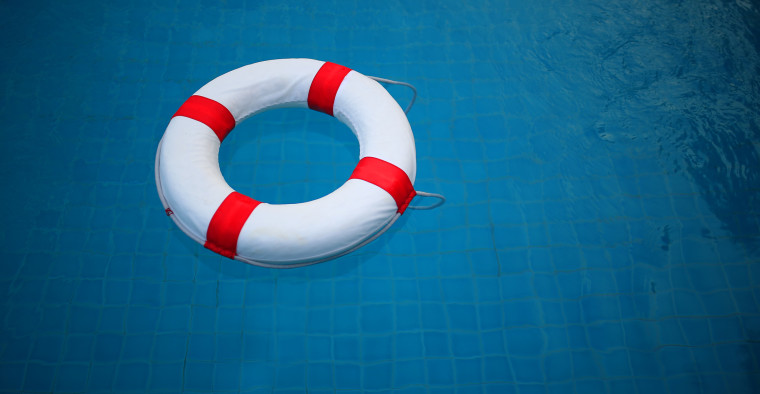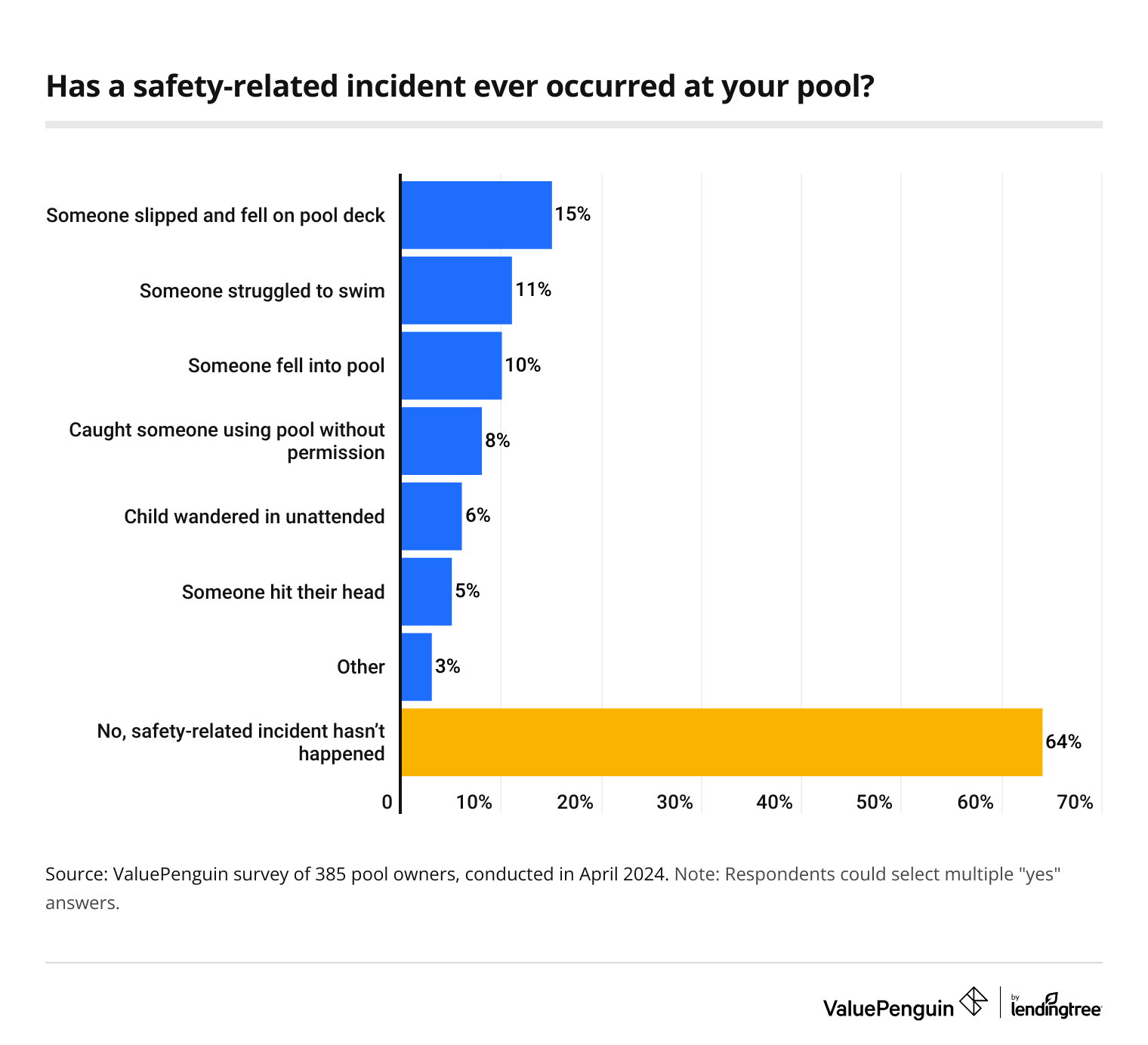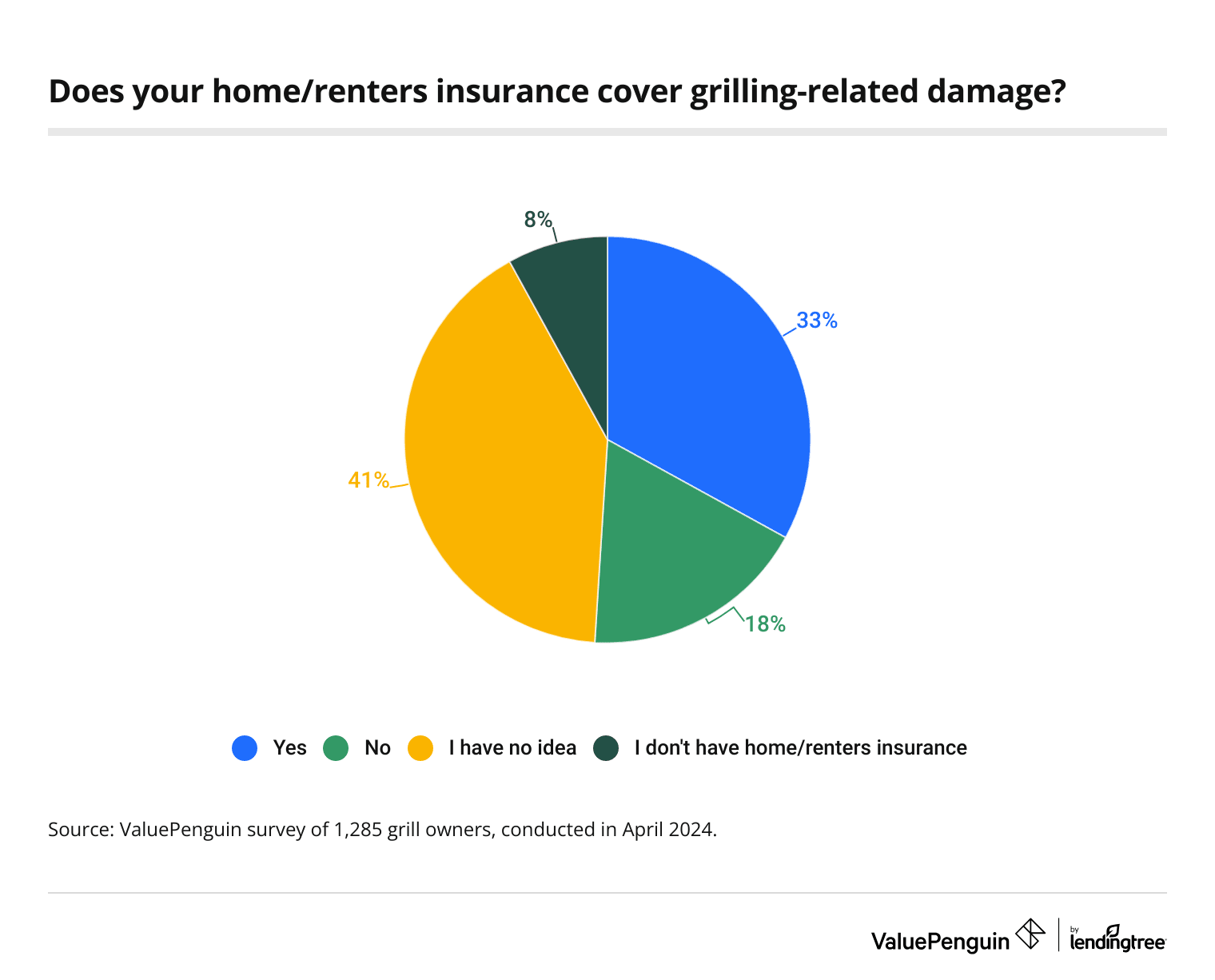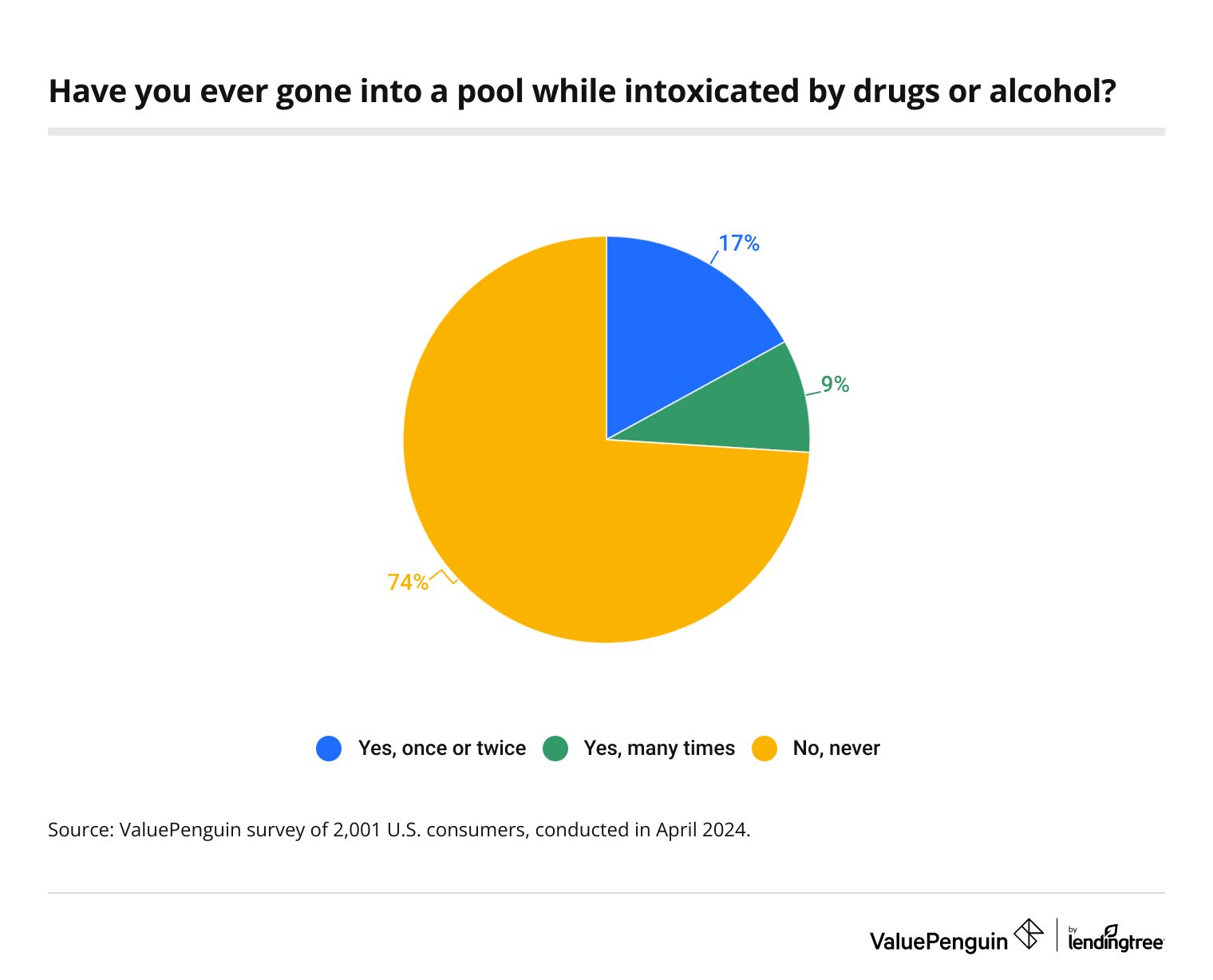Homeowners Insurance
Pools, Grills and Explosives: Americans Plan to Celebrate Summer With Risky Behaviors

For many Americans, summer means celebrating warmer weather with more outdoor activities and social gatherings. But action-packed summers also introduce an increased risk of injury and other potential health hazards.
According to a new ValuePenguin survey, some homeowners may not prioritize safety ahead of summer’s festivities, exposing people to unnecessary risks and liability.
Here’s what we found.
On this page
Key findings
- Pools can be pricey and pose certain safety risks, but most pool owners say it's worth the added expense and liability. Even though 36% of pool owners say they’ve had at least one safety-related incident at theirs, 82% still say it’s worth the added liability. However, 19% of Americans don’t know how to swim, and 39% aren’t confident in their ability to help someone struggling in the water.
- Most Americans plan to grill this summer, but many could use a refresher on grilling safety. Among grill owners, only a third (33%) are confident their home or renters insurance covers grilling-related damages. Meanwhile, 37% don’t clean their grill after every use — a basic safety measure. Overall, about 1 in 10 (11%) grill users have been involved in a grilling-related incident, while 14% of Americans think they may have (or know they have) suffered from food poisoning from grilled foods.
- If water and open flames weren’t enough, many plan to celebrate the summer with explosives. Almost a third (32%) of Americans plan to buy fireworks this summer; however, 16% say they’ve been injured by them in the past. Additionally, 53% believe it’s safe for children to play with fireworks or sparklers, with 21% feeling comfortable letting children 12 or younger use them unsupervised.
- Booze isn’t helping mitigate summer hazards. 26% of Americans say they’ve gone into a pool while intoxicated (with drugs or alcohol), and 25% admit to grilling under the influence.
Pool owners think the risk is worth the liability
It wouldn’t be summer for many without an opportunity to swim, and nearly two-thirds (65%) have access to a pool. About 19% have a pool on their property, tying with community pools (think YMCAs, gyms, swim clubs and more) as the most popular method of access.
Swimming can come with risks, though, particularly for those with private access. Among those with pools, 36% say they’ve had at least one safety-related incident at theirs. Most commonly, pool owners say they’ve had someone slip and fall on their pool deck (15%). Following that, 11% of pool owners say someone struggled to swim and 10% have had someone fall in.

According to ValuePenguin home insurance expert Divya Sangameshwar, homeowners with pools should be extra cautious. "Swimming pools are great fun during the summer," she says. "But while we don’t want to think about things that could go wrong, not knowing the liabilities that come with pool ownership will put homeowners at significant financial risk."
That said, 82% of pool owners say one on their property is worth the added liability. Despite pool owners with kids younger than 18 being the most likely group to say they’ve had a safety-related incident (48%), they’re also the most likely to say it’s worth the added liability (88%).
However, the risks may be higher than most pool owners expect. Across all Americans, nearly 1 in 5 (19%) don’t know how to swim — a figure that’s particularly high among those earning less than $30,000 (29%) and baby boomers ages 60 to 78 (25%). Meanwhile, 39% aren’t confident in their ability to help someone struggling in the water. Still, 12% of Americans would let a child 12 or younger use a pool without supervision.
What’s more, many pool owners don’t have basic security measures in place. Across all pool owners, 90% don’t have an underwater pool alarm to alert them in case a guest, child or pet has fallen into the pool, while 80% have no signage about the risks of using their pool (which may increase the risk of liability). While 69% have a pool fence, 84% don’t have a gate with an alarmed door. Adding an additional slip-and-fall risk, 74% have diving boards or water slides.
Still, pool owners employ some safety measures. Among this group, 41% have a cover for when the pool is not in use.
Grill owners aren’t sure about their insurance coverage
Grilling is another summer staple, and 78% of Americans plan to use a grill this summer. About 64% own a grill — charcoal (54%) and gas (49%) are far more popular than their electric counterparts (15%).
However, only 33% of grill owners are confident their home or renters insurance covers grilling-related damages. Another 41% say they have no idea if these damages are covered.

Those who are confident are correct, Sangameshwar says. "The liability portion of your homeowners or renters insurance will cover you for grilling-related injuries to guests, covering both medical bills and potential lawsuits," she says. "In the rare instance of a grill fire, your homeowners or renters insurance provides financial protection since fire is a covered peril. A homeowners policy will cover damage to the house itself. Homeowners and renters insurance will also cover damage to personal possessions, such as lawn furniture."
What risks does grilling pose? Cleaning is a basic safety measure, particularly to prevent food poisoning. However, 37% don’t clean their grill after every use. Gen Zers ages 18 to 27 and millennials ages 28 to 43 are the grossest grillers, with 46% of Gen Zers and 38% of millennials saying they don’t clean their grill after every use.
While 63% clean their grill after every use, 24% clean it every two to three uses. Another 7% clean it every four to five uses and 6% clean it less often.
Overall, 11% of grill users have been involved in a grilling-related accident, with Gen Zers (16%), millennials (15%) and men (14%) among the most likely to suffer from a mishap.
Notably, 12% of grillers with kids have allowed their children to grill unsupervised at least once — a figure that rises to 18% among those with kids younger than 18. Additionally, 6% of Americans feel comfortable letting a child 12 or younger use a grill unsupervised. However, grills pose serious risks to young kids. According to a ValuePenguin study on grilling injuries, those younger than 20 accounted for 28% of emergency department visits for grilling-related injuries between 2012 and 2021.
Meanwhile, 14% of Americans think they may have (or know they have) gotten food poisoning from eating grilled foods. Gen Zers (25%), millennials (21%) and men (19%) are among the most likely to report this.
Fireworks pose additional risks, particularly for children
Beyond the usual summer plans, many plan to celebrate the season with a bang. In fact, 32% of Americans plan to buy fireworks this summer. That’s especially true among Gen Zers (55%), those with children younger than 18 (52%) and millennials (44%).
Still, 16% of Americans have been injured by fireworks in the past, with 7% reporting an injury that required an emergency room trip. Despite this, 53% believe it’s safe for children to play with fireworks or sparklers, though 47% believe it's OK only if an adult is present. Separately, 21% of Americans feel comfortable letting children 12 or younger use them unsupervised.
This comes despite the risk involved with playing with fireworks and sparklers, which can burn as hot as 2,000 degrees Fahrenheit. According to Consumer Product Safety Commission data, those 14 and younger accounted for 28% of the estimated fireworks-related injuries between mid-June 2022 and mid-July 2022.
Swimming (or grilling) under the influence is common
Despite the already present risks involved with swimming or grilling, that doesn’t stop many Americans from adding a new level of risk. Just over a quarter (26%) of Americans say they’ve gone into a pool while intoxicated (whether drugs or alcohol). That’s especially true among parents with young children (38%), millennials (37%) and Gen Zers (35%).

What’s more, 82% of homeowners with pools have allowed someone to swim alone in their pool and 73% let an intoxicated person swim in their pool. While it’s common for public pools to have a trained lifeguard on duty (65% of Americans with access to a shared pool cite this), that won’t be the case for a home pool, meaning homeowners can’t afford to take a relaxed safety attitude.
Meanwhile, a quarter (25%) of Americans have grilled under the influence.
"Not only will drunk barbecuing or swimming increase guests’ risk of injuries on the property — and open hosts to liability claims — intoxicated guests can also open homeowners to social host liability," Sangameshwar says.
In total, 43 states have social host liability laws that offer an injured person a method to sue the person who served the alcohol. "While a social host isn’t liable for injuries sustained by a drunken guest outside their property, the host can be held liable for third-party harm," she says.
Gearing up for summer: Top expert tips
While physical safety is important, Americans should also prioritize their financial safety ahead of the summer party season. In fact, 35% don’t have (or don’t think they have) personal injury or personal liability coverage on their homeowners insurance — an important starting point, Sangameshwar says, for those who plan to host pool parties or barbecues or buy fireworks.
Beyond that, she recommends the following:
- Take basic steps to ensure the safety of your guests. This includes keeping a fire extinguisher handy for grilling fires, not allowing unsupervised play around pools, skipping the backyard fireworks and limiting the amount of alcohol you serve.
- Secure your property properly, particularly if you’re a pool owner. "If you aren’t securing your pool, your insurance company can exclude liability coverage for it," Sangameshwar says. "This would apply even if the swimmers were there without your permission or knowledge. The key is securing your pool with a fence and a childproof lock, adding a pool cover when the pool is not in use, putting up signs warning users of the potential dangers and installing underwater alarms that’ll notify you if anyone enters the pool without your knowledge."
- Do a thorough insurance checkup before you open your doors to party guests. "The dangers of not knowing what your insurance covers could expose you to financial risk, especially if you’re underinsured," she says. "If you’ve made significant updates to your home but haven’t added that to your policy or if your net worth increased recently but your liability coverage is low, you may be on the hook for the cost of repairs for your home or medical bills for your guests beyond what your current policy will cover. Enough insurance coverage will offer you financial peace of mind if something goes wrong."
Methodology
ValuePenguin commissioned QuestionPro to conduct an online survey of 2,001 U.S. consumers ages 18 to 78 from April 15 to 17, 2024. The survey was administered using a nonprobability-based sample, and quotas were used to ensure the sample base represented the overall population. Researchers reviewed all responses for quality control.
We defined generations as the following ages in 2024:
- Generation Z: 18 to 27
- Millennial: 28 to 43
- Generation X: 44 to 59
- Baby boomer: 60 to 78
